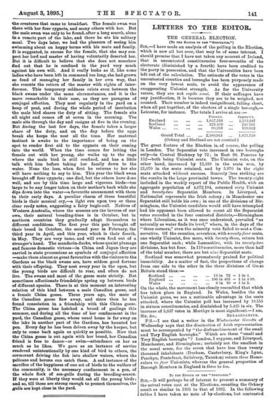LETTERS TO THE EDITOR.
THE GENERAL ELECTION.
pro ma EDITOR Or THE "SPECTATOR."] SIR, —I have made an analysis of the polling in the Election, which is now all but over, that may be of some interest. I should premise that I have not taken any account of Ireland, that in uncontested constituencies four-sevenths of the electorate (diminished by a fourth) have been credited to the party in possession, and that the Universities have been left out of the calculation. The estimate of the votes in the uncontested counties and boroughs has been purposely made on the very lowest scale, to avoid the appearance of exaggerating Unionist strength. As for the University voters, they are not capite eensi. If their suffrages have any justification, it is because they are to be weighed, not counted. Their number is indeed insignificant, falling short, when all put together, of the electors of a single borough,— Leicester, for instance. The totals I arrive at are :—
Unionist. Sopa me t.
En gland
e••
...
1,857,553 1,512,247 Scotland
•••
225,109 241 901
Wales
•••
93,253 119,612
Grand Total ...
2,180,915 ...
1,873,700 (Orkney and Shetland are not counted.)
The great feature of the Election is, of course, the polling in London. The Separatist vote increased in two boroughs only—in Central Hackney by 72; in East St. Pancras by 152—both being Unionist seats. The Unionist vote, on the other hand, increased by 12,410 in the seats won, by 21,070 in the seats retained, and by 5,976 in the eight seats attacked without success. Scarcely :less striking are the results in the large provincial towns. The twenty-eight included in the weekly report of the Public Health, with an aggregate population of 4,672,104, returned sixty Unionist and twenty-two Separatist Members. In Liverpool, a Nationalist represents the Irish colony ; in Manchester one Separatist still holds his own ; in one of the divisions of Bir- mingham, the Unionist candidate would still have triumphed had his opponent been allowed to count all the Separatist votes recorded in the four contested districts,—Birmingham where Liberalism, as it was once understood, prevailed "as naturally as water finds its level," where, in the days of the "three corners," even the minority vote failed to seat a Con- servative. Of the counties, seventeen, with seventy-four seats, one wholly Unionist, five more, with twenty-three, return but one Separatist each ; while Lancashire, with its twenty-two divisions, has but four. In 119 constituencies, more than half of the total number, there are but nine Separatist seats.
Scotland was somewhat prematurely praised for political immobility. As a matter of fact, the proportions of change from one side to the other in the three divisions of Great Britain stand thus :—
Scotland 404 ... 13 in 72 = 1 in 4.
England ... ... 106 in 465 = 1 in 4.33.
Wales 6 in 30 — 1 in 5.
On the whole, the movement has closely resembled that which has taken place in England. In Wales, besides the six Unionist gains, we see a noticeable advantage in the seats attacked, where the Unionist poll has increased by 18,555 in sixteen constituencies, and diminished by 5,425 in six. The increase of 5,837 votes in Merthyr is most significant.—I am,
Sir, Sze., SE XAGENA RUTS.
p.5.—I see that a writer in the Westminster Gazette of Wednesday says that the diminution of Irish representation must be accompanied by "the disfranchisement of the small and Tory English boroughs." Which are these "small and Tory English boroughs " ? London, I suppose, and Liverpool, Manchester, and Birmingham; certainly not the smallest in the usual sense, for the seven that have less than twenty thousand inhabitants (Durham, Canterbury, King's Lynn, Penrhyn, Pontefract, Salisbury, Taunton) return three Home- rulers to four Unionists, whereas the general proportion of Borough Members in England is three to ten.


































 Previous page
Previous page